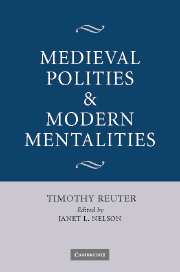Book contents
- Frontmatter
- Contents
- Editor's note
- Acknowledgements
- List of abbreviations
- Editor's introduction
- PART I MODERN MENTALITIES: HISTORIOGRAPHIES, METHODOLOGIES, PRECONCEPTIONS
- 1 Modern mentalities and medieval polities
- 2 Medieval: another tyrannous construct?
- 3 The insecurity of travel in the early and high Middle Ages: criminals, victims and their medieval and modern observers
- 4 Debating the ‘feudal revolution’
- 5 Pre-Gregorian mentalities
- 6 Whose race, whose ethnicity? Recent medievalists' discussions of identity
- PART II THE SYMBOLIC LANGUAGE OF MEDIEVAL POLITICAL ACTION
- PART III POLITICAL STRUCTURES AND INTENTIONS
- Index
2 - Medieval: another tyrannous construct?
Published online by Cambridge University Press: 12 August 2009
- Frontmatter
- Contents
- Editor's note
- Acknowledgements
- List of abbreviations
- Editor's introduction
- PART I MODERN MENTALITIES: HISTORIOGRAPHIES, METHODOLOGIES, PRECONCEPTIONS
- 1 Modern mentalities and medieval polities
- 2 Medieval: another tyrannous construct?
- 3 The insecurity of travel in the early and high Middle Ages: criminals, victims and their medieval and modern observers
- 4 Debating the ‘feudal revolution’
- 5 Pre-Gregorian mentalities
- 6 Whose race, whose ethnicity? Recent medievalists' discussions of identity
- PART II THE SYMBOLIC LANGUAGE OF MEDIEVAL POLITICAL ACTION
- PART III POLITICAL STRUCTURES AND INTENTIONS
- Index
Summary
This article examines how far the use of the term ‘medieval’ restricts or distorts our understanding of the period conventionally termed so. The tripartite ancient–medieval–modern scheme entered historical writing in the seventeenth century, but the term soon took on its own life outside historiography. Within historiography, the tripartite division has remained the dominant periodisation, even though plausible alternatives have been offered. However, those working as European medievalists only rarely see themselves as forming a group studying a coherent and discrete socio-cultural formation: apart from anything else, Europe itself is as problematic a notion as the Middle Ages. The term, within academe, is now largely a conventional one. This appears also to be the case for the use of the term in extra-European contexts: it denotes either a post-classical age or a feudal society (here as in non-academic usage, medieval and feudal are often synonymous). The temporal limits vary, though there are broad similarities. The article argues that the term is too conventionalised to be of much use in any dialogue between medievalists of different parts of the globe: it does not clearly define either a social formation or a stage of development.
The title of this article is adapted from that of a well-known article by E. A. R. Brown on feudalism. In the course and under the influence of the Cold War, non-Marxist western medievalists, at least those working in German- and English-speaking countries, had already agreed to restrict the notion of feudalism to a small bundle of phenomena centred around the delegation of political and judicial authority and the organisation of military service.
- Type
- Chapter
- Information
- Medieval Polities and Modern Mentalities , pp. 19 - 37Publisher: Cambridge University PressPrint publication year: 2006

